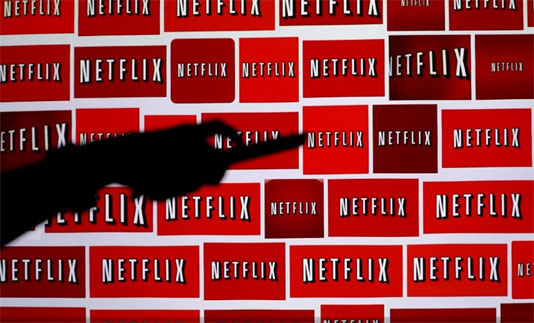SAN FRANCISCO, Oct 17, 2019 (BSS/AFP) – Netflix shares rallied Wednesday
after its latest quarterly update showed robust subscriber growth and better-
than-expected profits ahead of a major escalation in the streaming television
war.
Netflix reported a net income of $665 million in the recently ended
quarter, jumping up from $403 million in the same period last year and
topping most analyst forecasts.
Revenue and subscriber growth, however, came in just shy of market
consensus. The California-based company saw revenue up 31 percent at $5.25
billion and added 6.8 million subscribers worldwide to reach a total of 158.3
million.
Netflix shares climbed more than 10 percent after-market trades.
The company, whose recent hits include “Stranger Things” and “The Crown,”
was upbeat on its ability to thrive even as powerful competitors such as
Disney and Apple enter the streaming market in November.
When Netflix began streaming television to subscribers online some 12
years ago — in a pivot from just lending video discs through the mail — it
was essentially Amazon Prime, Hulu, YouTube and Netflix itself competing with
traditional television, chief executive Reed Hastings said in an earnings
broadcast.
And all of the streaming rivals will still find their main competition in
broadcast TV, according to Hastings, who was confident Netflix would thrive
through compelling original shows.
“We see both Apple and Disney launching essentially the same week after 12
years of not being in the market,” Hastings said.
“Fundamentally, it is more of the same. Disney will be a great competitor;
Apple is just beginning but, you know, they will probably have some great
shows too.”
– Clouds loom? –
But eMarketer analyst Eric Haggstrom said the latest report includes
signs of trouble ahead for the market leader, which fell short of its
subscriber targets.
“The fourth quarter represents a completely new ballgame for Netflix as
Disney+ and Apple TV+ will compete not just for subscribers, but for hit
shows as well,” Haggstrom said.
“The fact that Netflix has shown disappointing growth without the new
competition present is a negative omen for Netflix in 2020 and beyond.”
And more competition looms on the horizon, as AT&T’s WarnerMedia will
launch its new Netflix rival “HBO Max” in early 2020 after reclaiming the
rights from Netflix to stream its popular television comedy “Friends.”
Netflix slightly trimmed its forecast for subscriber growth, saying it
expected the count to be up 26.7 million at the end of this year, but that
its positive outlook for the future remained firm.
It cited factors such as uncertainty about new viewers, response to price
changes and forthcoming competition.
The third quarter’s rise in revenue also means Netflix could invest to
improve the service and make more original shows to battle competition in
markets around the world.
“We have been moving increasingly to original content both because of the
anticipated pullback of second run content from some studios and because our
original content is working in the form of member viewing and engagement,”
Netflix said.
“We’re expanding our non-English language original offerings because they
continue to help grow our penetration in international markets.”
Netflix has released originally produced local language shows in 17
countries and has plans to expand to 30, according to chief content officer
Ted Sarandos.
Netflix’s original films released in the recently ended quarter included
“solid hits” such as “Secret Obsession,” starring Brenda Song, and
“Otherhood,” directed by Cindy Chupack.
Netflix-backed films set for release this quarter include Martin
Scorsese’s “The Irishman,” with actors Robert De Niro, Al Pacino, and Joe
Pesci, and “Marriage Story,” starring Scarlett Johansson and Adam Driver.
“Amazing content can be expensive,” Netflix said.
“We don’t shy away from taking bold swings if we think the business impact
will also be amazing.”
Netflix said it would spend about $15 billion in cash on content this
year, with the majority of that money devoted to producing original shows.
Netflix also sees its technology platform as an advantage, enabling it to
stream to people on all kinds of devices and to mine mountains of data to
feed users recommendations about what to watch next — and to give producers
insights about what audiences like.
Hastings reasoned that with Facebook and YouTube boasting billions of
active users, and billions of mobile phones users who can stream shows from
the internet, there is a huge market for Netflix and its rivals to share.



